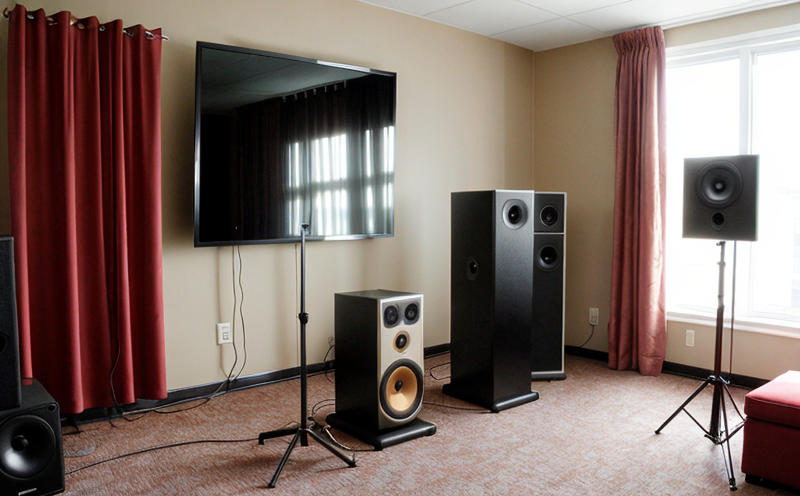ISO 532-1 Loudness Perception Testing (Zwicker Method)
The Zwicker method, as specified in ISO 532-1, is a standardized approach to measuring loudness perception. This method is widely used in the audio engineering and acoustics sectors where accurate auditory assessment of sound quality is crucial. The primary focus is on evaluating how human listeners perceive loudness levels, which can significantly impact product design and compliance with industry standards.
The Zwicker method involves a series of carefully designed listening tests to quantify loudness based on the perceived intensity of sound by human subjects. It relies on the principles that the perception of loudness is not simply proportional to physical intensity but is influenced by frequency, duration, and other psychoacoustic factors. This makes it essential for industries such as audio production, telecommunications, and consumer electronics.
The testing process typically involves exposing listeners to a series of sound stimuli and asking them to rate the perceived loudness on a standardized scale. The results are then averaged across multiple subjects to provide an objective measure of loudness perception. This method is particularly useful for ensuring that products meet the auditory expectations of their target audience, thereby enhancing user satisfaction.
The application of ISO 532-1 in various sectors has led to significant improvements in product design and quality control. For instance, in audio production, it ensures that the perceived loudness of music tracks aligns with industry standards, thus maintaining consistency across different playback systems. In telecommunications, it helps in optimizing voice clarity for better user experience.
One of the key advantages of using ISO 532-1 is its ability to provide a standardized framework for comparing loudness perception across different products and environments. This ensures that any deviations from expected performance can be identified and addressed early in the development process, leading to more robust designs and higher quality end products.
Furthermore, this method supports compliance with international standards such as ISO 532-1, which is recognized globally for its accuracy and reliability. By adhering to these standards, companies can ensure that their products meet regulatory requirements and industry best practices, thereby reducing the risk of non-compliance issues.
In conclusion, ISO 532-1 Loudness Perception Testing (Zwicker Method) plays a vital role in ensuring consistent and accurate loudness perception across various sectors. Its application not only enhances product quality but also supports compliance with international standards, making it an indispensable tool for quality managers, R&D engineers, and compliance officers.
Eurolab Advantages
Eurolab offers unmatched expertise in ISO 532-1 Loudness Perception Testing (Zwicker Method), providing comprehensive solutions to meet the diverse needs of our clients. Our team of professionals is dedicated to delivering accurate and reliable results, ensuring that your products meet international standards.
- Comprehensive testing services for various sectors
- Expertise in interpreting and analyzing test data
- State-of-the-art equipment and facilities for precise measurements
- Trained personnel with extensive experience in psychoacoustics
- Compliance with international standards such as ISO 532-1
- Customized testing solutions to meet specific client requirements
- Timely delivery of accurate reports and recommendations
- Dedicated support throughout the testing process
Eurolab’s commitment to excellence ensures that you receive high-quality results, which are critical for maintaining a competitive edge in the market.
Quality and Reliability Assurance
- EuroLab's ISO 532-1 Loudness Perception Testing ensures that sound products meet international standards, enhancing user satisfaction.
- The testing process involves standardized listening tests to measure loudness perception accurately.
- EuroLab uses state-of-the-art equipment and facilities for precise measurements in various sectors.
- Trained personnel provide expertise in interpreting and analyzing test data.
- We support compliance with international standards such as ISO 532-1, ensuring high-quality results.
Our quality assurance processes are designed to ensure that every aspect of the testing is conducted accurately and reliably. This includes rigorous calibration of equipment, strict adherence to standard procedures, and continuous monitoring of test environments.
The reliability of our tests is further enhanced by our experienced team of professionals who have extensive knowledge in psychoacoustics. They ensure that each test is conducted under controlled conditions, minimizing the impact of external factors on the results.
By leveraging these advantages, EuroLab guarantees consistent and accurate loudness perception testing, supporting compliance with international standards. Our commitment to quality and reliability ensures that your products meet the highest industry expectations.
Competitive Advantage and Market Impact
EuroLab's ISO 532-1 Loudness Perception Testing (Zwicker Method) offers significant competitive advantages in several key areas:
- Enhanced User Satisfaction: By accurately measuring loudness perception, we ensure that your products meet the auditory expectations of your target audience.
- Compliance with International Standards: Our tests help you comply with international standards such as ISO 532-1, ensuring regulatory and industry best practices are followed.
- Innovation Support: We provide customized testing solutions to support product development and innovation in various sectors.
- Market Leadership: By maintaining consistent quality and reliability, we help you establish a strong market presence and leadership position.
- Cost Efficiency: Our accurate and reliable tests reduce the need for costly rework or recalls due to non-compliance issues.
The impact of EuroLab's testing services extends beyond individual products; it contributes to the overall success of your organization by ensuring that every aspect of sound quality is optimized. This enhances customer loyalty, drives innovation, and supports sustainable growth in the market.





